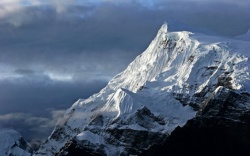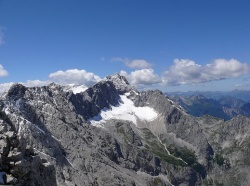Difference between revisions of "Mountain"
| Line 6: | Line 6: | ||
{{W}} | {{W}} | ||
| − | ==Articles containing | + | ==Articles containing word "Mountain" in this Encyclopedia== |
<DPL> | <DPL> | ||
Revision as of 07:35, 24 February 2014
A mountain is a large landform that stretches above the surrounding land in a limited area, usually in the form of a peak. A mountain is generally steeper than a hill. Mountains are formed through tectonic forces or volcanism. These forces can locally raise the surface of the earth by over 10,000 feet (3,000 m). Mountains erode slowly through the action of rivers, weather conditions, and glaciers. A few mountains are isolated summits, but most occur in huge mountain ranges. High elevations on mountains produce colder climates than at sea level. These colder climates strongly affect the ecosystem of mountains: different elevations have different plants and animals. Because of the less hospitable terrain and climate, mountains tend to be used less for agriculture and more for resource extraction and recreation, such as mountain climbing. The highest mountain on Earth is Mount Everest in the Himalayas of Asia, whose summit is 8,849.868 m (29,035 ft) above mean sea level. The highest known mountain on any planet in the Solar System is Olympus Mons on Mars at 21,171 m (69,459 ft).
Source
Articles containing word "Mountain" in this Encyclopedia
- 'A State Of Siege': Russian Buddhists, Mining Company In Mountaintop Showdown
- A Death on Diamond Mountain
- A Mountain as Multiverse
- A PTopical Outline of the Prayer That Swiftly Fulfils All Wishes (Sampa Nyur Drupma)rayer of Aspiration for the Copper-Coloured Mountain of Glory
- A Prayer of Aspiration for the Copper-Coloured Mountain of Glory by Chokgyur Dechen Lingpa
- A Rain of Blessing from the Copper Coloured Mountain
- Adamantine Mountains
- Advice for Mountain Retreat
- Bhutan and Its Buddhist Traditions - Myths & Mountains
- Biography/story of Milarepa : A Tibetan Monk who climbed Mountain Kailash
- Blue Mountains Insight Meditation Centre
- Buddhist Pilgrimage “The Four Sacred Mountains of Chinese Buddhism: Presence of Bodhisattvas
- Buddhist holy sites Wutai Mountain
- Buddhist ritual held on Jiuhua Mountain in E China's Anhui
- Buddhists Add Unusual Touch to Bulgarian Mountain
- Buddhists Add Unusual Touch to Bulgarian Mountain II
- Building a Sacred Mountain: The Buddhist Architecture of China's Mount Wutai
- Circling the Sacred Mountain - Lion's Roar
- Copper Colored Mountain Prayer
- Dawn Mountain: Home
- Dharma Drum Mountain
- Dharma Drum Mountain Buddhist Association
- Dharma Drum Mountain Global Website
- Dharma Drum Mountain Melbourne Chapter
- Dharma Sangha - Crestone Mountain Zen Center
- Dol-bo-ba Shay-rap-gyel-tsen,• author of the Mountain Doctrine, Ocean of Definitive Meaning: Final Unique Quintessential !mtructiom,b
- Druk Amitabha Mountain
- East Mountain Teaching
- East Mountain Teaching Explained
- Elephant head mountain
- Examining a bias in evaluating conservation effectiveness for Galliformes on a typical Tibetan sacred mountain
- First There Is a Mountain (Then There Is No Mountain)
- Five Manjushri of Wutai Mountain (Video)
- Five Mountain Monasteries of China
- Five Mountain System
- Five Mountains Sangha
- Five Peaked mountain
- Four Sacred Mountains
- Four sacred mountains
- Furnace Mountain
- Gambo Utse mountain
- Gold Mountain Dhyana Monastery
- Great Stupa Mountain Hermitage
- Guru Rimpoche's Glorious Copper-Coloured Mountain Paradise
- Gṛdhrakūṭa Mountain
- Holy mountain
- Hopi Legend of Shambhala and the Sacred Mountain Mount Meru
- Immortal Mountain Insight into the World of Chinese Fantasy Novels
- Is Mt Kailash the Oldest Mountain in the Himalaya?
- Is this Mountain from Outer Space? - Sadhguru
- Kailash: the mountain that calls
- Kailash: the sacred mountain for four religions
- Kailash and unclimbed 'holy' mountains
- Kailash is considered a sacred mountain by Buddhists, Jains
- Kalachakra: The Vulture Peak Mountain
- Karma Chakme's Mountain Dharma
- Keiryuji (or Mountain Stream Temple)
- Khenpo Tsultrim Gyatso Rinpoche Instructions on The Ocean of Definitive Meaning of Mountain Dharma by Dolpo Sangye & on Singing
- Korean Water And Mountain Spirits
- LingYen Mountain Temple
- Living Buddhas: The 1,000-day Journey of the Monks of the Mountains
- Locating the Copper-Colored Mountain: Buddhist Cosmology, Himalayan Geogr an Geography, and Maps of Imagined W , and Maps of Imagined Worlds
- Majestic beauty of sacred Yen Tu Mountain
- Manifestations of the Mountain: Preliminary Remarks on the Utopian Study of Potalaka in Pre-modern East Asia
- Mantra - Buddha Mountain
- Marble Mountains (Vietnam)
- Masked Dance of Sumthrang Mountain Deity
- Mchog gyur gling pa’s Visionary Journey to the Copper-Colored Mountain
- Merit, Karma, and Exchange: Chinese Buddhist Mountain Tourism Company Listings on the Stock Market
- Mongolia's Ten Sacred Mountains – Sacred Land
- More on Wutai Mountain China
- Mount Kailash: Offering to the Sacred Mountain
- Mount Kailash Kora: Trekking Around Tibet's Sacred Mountain
- Mount Meru, a golden mountain
- Mount Meru – Hell and Paradise on One Mountain
- Mount Wutai: Visions of a Sacred Buddhist Mountain by Wen-shing Chou (review)
- Mount Wutai Visions of a Sacred Buddhist Mountain
- Mountain Gods & Local Deities
- Mountain Gods Worshipped by the Tibetans
- Mountain Gods and Goddesses of Tibet
- Mountain Gods and Trance Mediums: A Qinghai Tibetan Summer Festival
- Mountain Incense-Smoke Offering
- Mountain Moon Zen Society
- Mountain Offering Ritual
- Mountain Sea Wisdom Unrestricted Power King
- Mountain Shapes and Water in Tibetan Geomantic Texts
- Mountain Smoke Offering
- Mountain Smoke Offering from Accomplishing the Life Force of the Vidyādharas
- Mountain Smoke Offering from the Life-Force Practice of the Vidyādharas (Rigdzin Sokdrup)
- Mountain Spirit
- Mountain View Buddhist Temple
- Mountain gods
- Mountain gods worshipped by the Tibetans
- Mountain school
- Mt Kailash and the Walk around the Sacred Mountain (Video)
- Mysteries Of The Mountains
- Nagas and mountain gods are not legends (Video)
- Nine-Story Mountain: The Making of a Pilgrimage
- Nine mountains and eight seas
- On local and mountain deities in Bhutan by Françoise Pommaret
- Pabbata Sutta: A Mountain
- Padmasambhava in the Copper Coloured Mountain (Thangka)
- Photos from the ‘sacred’ mountains of Tibet, & Peru
- Pilgrimage Guide of the Tibetan Buddhist Holy Mountain Brag dkar sprel rdzong
- Pilgrimage to The Immaculate Crystal Mountain of Tsari
- Polar Mountain
- Puto Mountain
- Regulations for Students of the Mountain School
- Ridam/Ladam: Closing Mountains to Human Activity
- Riwo Sang Chöt, “The Mountain of Burnt Offering”
- Sacred Mountain Sangha
- Sacred Mountains: Themes and Teachings
- Sacred Mountains & Lakes of Tibet
- Sacred Mountains of China
- Sacred Sites and Pilgrimage Routes in the Kii Mountain Range, and the Cultural Landscapes that Surround Them
- Sacred mountain
- Sacred mountains
- Sacred mountains II
- Scenic and historic area of Sacred Mountains and Lakes
- Secret Path to the Mountain of Glory
- Secret Path to the Mountain of Glory—A Prayer of Aspiration for the Copper-Coloured Mountain of Glory
- Seeking Solitude in Japan's Mountain Monasteries
- Seven golden mountain ranges
- Shaman of the Glorious Copper-Coloured Mountain
- Shambhala & the Sacred Mountain: Flat Earth's Inner Light Body (Video)
- Shambhala Mountain Center
- Shambhala Mountain Center - The Great Stupa of Dharmakaya (Video)
- Sikong Mountain
- Snow Mountains
- Song of the Eastern Snow Mountains
- Spirit-mediums, Sacred Mountains and Related Bon Textual Traditions in Upper Tibet: Calling Down the
- Spirit‐mediums, Sacred Mountains and Related Bon Textual Traditions in Upper Tibet: Calling Down the Gods
- Sri Pada - Buddhism's Most Sacred Mountain
- Sun Mountain Zen Community
- System of Mountain Gods in Tibet
- THE Mountain YOGI - Pooye Lama Gomchen Milarepa - Documentry on Gobind lama (Video)
- Take a Zen Buddhist Pilgrimage at a Primeval Mountain Path Yamadera
- Tales of Conjured Temples (huasi) in Qing Period Mountain Gazetteers by Susan Andrews
- Tales of the Living Buddha of Golden Mountain
- Tassajara Zen Mountain Center
- Temples, Timber, and Negotiations : Buddhist-Lay Relations in Early Modern Japan through the Prism of Conflicts over Mountain Resources
- The 5 Famous Mountains of Buddhist in China (Video)
- The Changing Roles of a Tibetan Mountain Deity in the Context of Emerging Environmental issues: Role of Dkar po lha bsham Deity in Gom ri Village of Yul shul
- The Chariot of Joy and Good Fortune "An Aspiration Prayer to Journey to the Glorious Copper-Colored Mountain"
- The Healing Buddha: Ancient Tibetan Wisdom for the Global Pandemic -- Teaching for Shambhala Mountain Retreat Center
- The History of the Dzogchen Natural Mountain Caves
- The History of the Mountain Teachings.
- The Holy Mountain, Jiu Hua Shan
- The Magic Mountain
- The Mountain Monks of Japan
- The Mountain Stairway.
- The Mythology of Tibetan Mountain Gods: An Overview
- The No.1 National Treasure of China Hides in the Deep Mountains of Shanxi (Video)
- The Sacrality of The Mountain
- The Sacred Dzogchen Natural Mountain Caves
- The Sacred Golden Mountain
- The Thirty-seven Practices of Bodhisattvas - Zen Mountain
- The mountain Meru
- Thirty Years as a Western Buddhist Monk An Interview With Ajahn Pasanno - by Fearless Mountain Magazine
- This Song of the Roar of the Mountain Lion That Is Not Yet a Snow Lion
- Tiantai Mountain
- Tibetan Buddhist temples highlight sacred mountain
- Tibetan Mountain Deities
- Tibetan Mountain Deities, Their Cults and Representations Proceedings of the 7th Seminar of the International Association for Tibetan Studies, Graz 1995
- Tibetan Mountain Gods
- Tibetan Mountain Spirit (V9deo)
- Tibetan Sacred Space Research Guide: Mountains and Mountain Monasteries
- Tibetans welcome mountain spirits in faith ceremony
- Top-Four China Buddhist Mountains
- Tortoise Mountain Sangha
- Vulture Peak Mountain
- WEI-CHENG LIN. Building a Sacred Mountain:
- Wangong Mountain
- What Is A Mountain? An Ethnohistory of Representation and Ritual at Pure Crystal Mountain in Tibet
- Why Hasn’t The Kailash Parvat Ever Been Climbed Yet...Secret of Kailash Mountain
- Why Mount Kailash is worshiped as the most sacred mountain
- Wolf Track Mountain
- Worship of a Mountain Deity in the Shadow of Shar-dungri: Adaptation and Survival of the Sakya Community in Shar-khog area of Amd
- Wutai Mountain (Video)
- Wutai Mountain China
- Wutai Mountain Named World Heritage Site
- Wutai Mountain Travel Guide - Travel Guide China
- Wutai Shan: Pilgrimage to Five-Peak Mountain
- Wutai Shan: Sacred Mountain of Manjushri (Video)
- Wutai Shan (Five Terrace Mountain),Shanxi, China (Video)
- Wutai shan: Pilgrimage to Five-Peak Mountain
- Yearning for Mountain Solitude
- Zen Mountain Monastery
- Zuni Mountain Stupa

